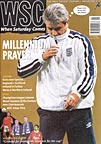 Liverpool's decline in the 1990s is often blamed on one man, but John Tandy sees it differently
Liverpool's decline in the 1990s is often blamed on one man, but John Tandy sees it differently
The myth goes something like this: Liverpool’s astonishing success was based on blending continuity and evolution. Graeme Souness smashed the club’s traditions and left it in a tattered state from which it has never recovered.
Hmm. If you look at the evidence, this would appear to be a rare case of history being rewritten by the losers. First, consider the circumstances of his appointment. There were his management credentials. Rangers before Souness had won no championships in eight years. With him they won four out of a possible five. Then consider his Anfield credentials: a successful player in one of their greatest eras, steeped in the lore and practices of the Boot Room.
If anything, it was Souness who was betrayed. Far from the blend he might reasonably have expected, he inherited a squad whose average length of service was nine years, who had once played great football but were now growing old together. It was clear that changes had to be sweeping and urgent. Souness’s strategy owed more to the Liverpool tradition than Dalglish’s had. He brought in players to steady the ship (with, admittedly, mixed results) but also, crucially, made an investment in youth that saw Robbie Fowler, Steve McManaman, Jamie Redknapp, Rob Jones and later Michael Owen come through.
Sadly, Souness never survived to reap the benefit of this long-term planning. Results were a while in coming (though not as long as for, say, Alex Ferguson at Manchester United or Don Revie at Leeds) and relations between the manager and fans soured, not helped by the fact that he talked to the Sun. It is criminal that some of the finest young players Liverpool have ever had should emerge from the Nineties with so little silverware to show. But that’s not Souness’s fault.
The club’s next move was a disastrously knee-jerk attempt to return to traditional values by putting their mildest, longest-serving Old Retainer in charge. Roy Evans may have been a nice bloke, a loyal servant, a one-club man, but he is also one of nature’s sidekicks, living proof that you don’t qualify yourself for a job just by waiting long enough. His first season saw Liverpool finish in their lowest league position since Shankly. Under Evans, Liverpool were Robin without Batman, Garfunkel without Simon, Taylor without Clough.
The club’s reaction to Evans’s failure was equally knee-jerk but in the opposite direction. First they jumped on the “foreign flair” bandwagon by recruiting Gérard Houllier, a man whose main claim to fame was to take France from the brink of qualification for the 1994 World Cup to a last-second defeat (and then to handle that defeat with such bad grace that David Ginola has been a scapegoat in his homeland ever since). Indeed, until last month it seemed the only innovation Houllier had brought to Liverpool was the inability to hang on to a lead. Then they compounded the folly by adding Phil Thompson to the mix, allegedly to provide “British grit” but in fact to act as a hit-man.
It is through this disastrous series of decisions that the Liverpool board has been responsible for creating the conditions that made the dismantling of the Boot Room inevitable and for failing to capitalise on a rich legacy left behind by Souness. Of course, the fact that they still do not see it that way does not fill you with great faith for the future, but for those of us who for years have enjoyed seeing Liverpool win, and seeing them win by playing fantastic football, the current inconsistency cannot but be frustrating.
From WSC 155 January 2000. What was happening this month